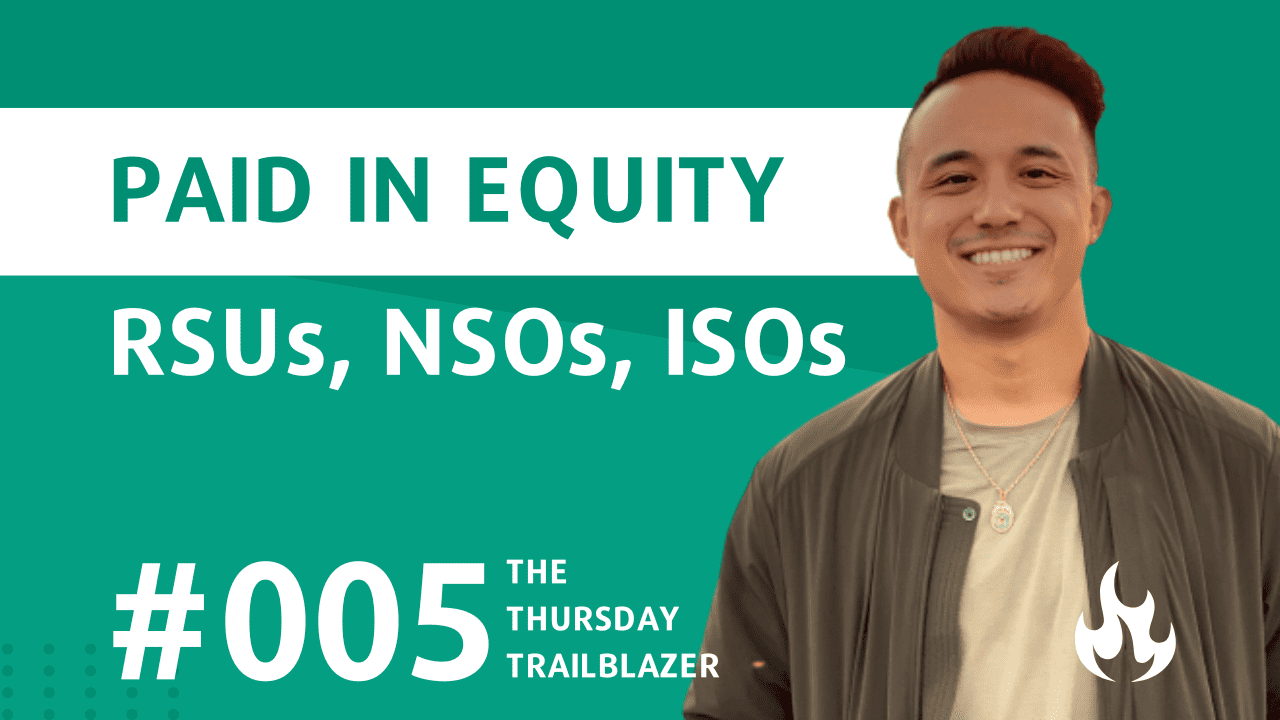T3 #005 – Equity Compensation 101: What are RSUs, ISOs, and NSOs?

Thank you Trailblazer Justine for inspiring this week’s post! If there is another topic you would like me to cover, please feel free to leave a comment or reply to this email with your thoughts!
Let’s hit pause and rewind a few years.
I had just received a job offer and read this:
Base Salary + Equity = Total Compensation
Okay, a salary I understand.
Money in my bank each pay day.
But, equity…
…what does that mean?
Depending on the company, you may see some of the following terms as your equity compensation:
- Restricted Stock Units (RSUs)
- Non-restricted stock options (NSOs)
- Incentive stock options (ISOs)
When I first read these contracts,
I was overwhelmed.
In the following sections I’ll detail some of the key things that I look for…
…as well as how I decide whether to buy, sell, or hold the equity (and the tax implications).
TL&DR: Equity compensation means that employees get a piece of ownership in the company, like company shares (RSUs) or options to buy (ISOs or NSOs). This type of compensation is given to align employees with how well the company does, and hopes to encourages them to stay with the company in the shared upside.
Note: I’ll be referring to NSOs or ISOs as “options” throughout this article.
Equity compensation comes with some conditions.
There are different things to consider with each type of equity that is being offered, but the following are usually the details that I am looking for:
Vesting Schedule
Most equity will not be given to you all at once.
But instead in small amounts over a predefined schedule known as a vesting schedule.
If you were on a 4-year vesting schedule…
…that means you’ll be given your equity compensation over 4-years.
There might also be a condition called a “cliff.”
If you have a 1-year cliff…
…that means you won’t be granted any equity until you’re with the company for 1-year.
What is common amongst technology companies is what is known as, “4 Years With a One Year Cliff.”
For the first 12 months, you’ll receive your salary…
…but not the actual equity.
After 12 months of being with a company, you’ll have ¼ of your equity vested all at once.
- In RSUs that is typically “given” to you as part of your compensation
- As options that’ll mean you now have the “right” to purchase your NSOs or ISOs
The remaining 3-years will be vested every month there after.
Of course, each company is different.
So make sure to read the fine print.
If you leave the company before reaching your cliff, you’ll also forfeit any equity that you’ve been working towards vesting. Something to consider, especially if you believe the company will do well in the future.
Timeframe: Right to Purchase Options
Applicable to NSOs or ISOs; less RSUs
Here’s the scenario:
You’ve now been with the company beyond the applicable cliff vesting period and have a number of vested options available.
You haven’t purchased (or what is known as exercise) them and intend to leave the company.
It’s important to know how long you have to exercise your options after you separate from the company.
Why?
Most companies allow up to 90 days to purchase your options.
Some are more generous with their terms…
…but if you miss this timeline – you forfeit your options.
I’ve had companies offer 90 days,
While other offering up to 5 years.
Make sure you understand which applies to your company options.

Tax Impact: Buy, Sell, or Hold
I try keep this to decision matrix as simple as possible.
If I believe in the growth of the company…
→ I’ll buy and hold the options or RSUs.
If I have less certainty in the company…
→ I’ll hold off purchasing my options or look to sell the RSUs after they are vested.
But what does that actually mean for RSUs?
Once you receive the vested RSUs, you can choose to hold onto the shares or sell them.
When RSUs vest, the fair market value (FMV) of the underlying stock on the vesting date is typically treated as ordinary income.
This value is added to your W-2 or reported on a 1099 form, depending on your employment status.
You can choose to hold onto the shares or sell them.
The decision on when to sell the shares can impact your tax liability.
If you hold onto the shares after they vest, any future gains or losses from selling the shares will be subject to capital gains tax.
What about ISOs or NSOs?
There is more variability within each of these options…
…with different times of when you will be taxed.
But one thing to note with options is that you will need to exercise or “buy” the company shares versus with RSUs they are ‘granted’ to you when you vest.
When deciding to exercise your vested options, calculate if you believe those shares will be worth more than what you are paying for them. Remember: You are not obligated to exercise (or purchase) those shares if you do not have faith in the future of that company.
For the sake of not being too brief on NSOs and ISOs, I’ll dive deeper into those in a separate article.
However, I would HIGHLY recommend working with a professional when you’re at this point.
TurboTax or whatever free software is nice to save a dollar here and there…
…but having someone that knows this in greater detail has been a lifesaver for me!
📚 Other Notable Resources
- Last Week’s Post: Over 65% of Americans are using their credit cards wrong
- Strategies to reduce your credit card balance: 7 Ways to Negotiate Your Credit Card Balance






